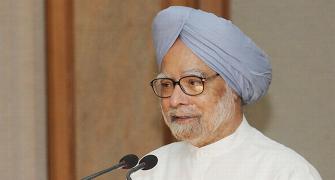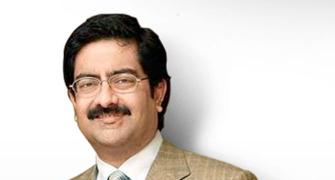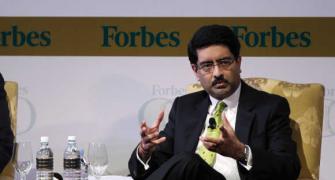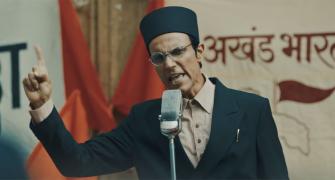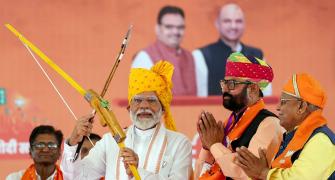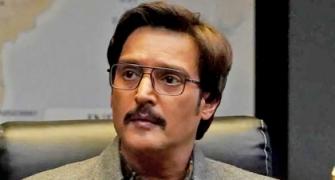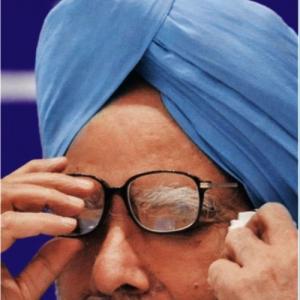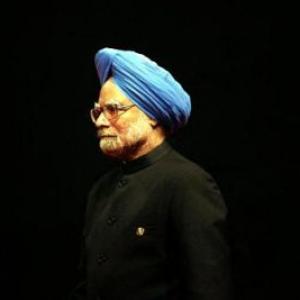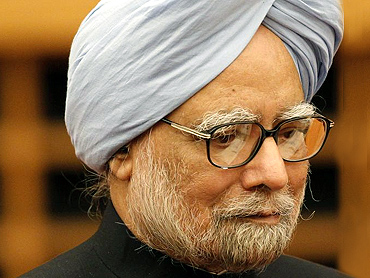 Dr Manmohan Singh's role in the sordid saga of the Coal Allocation Scam was always Delhi's worst-kept secret; calls for his interrogation will mushroom after he was named by former coal secretary P C Parakh, says T V R Shenoy.
Dr Manmohan Singh's role in the sordid saga of the Coal Allocation Scam was always Delhi's worst-kept secret; calls for his interrogation will mushroom after he was named by former coal secretary P C Parakh, says T V R Shenoy.
When will the Central Bureau of Investigation question Dr Manmohan Singh?
That is a 'when', not an 'if ever'.
The CBI can either do so unprompted, or wait until it is nudged in the right direction. Dr Manmohan Singh's role in the sordid saga of the Coal Allocation Scam was always Delhi's worst-kept secret; calls for his interrogation will mushroom after he was named by Prakash Chandra Parakh.
But let us backtrack a little. What exactly was the Coal Allotment Scam, and what was former coal secretary P C Parakh's part in it?
Very briefly, the Government of India decided to allot the rights to mine coal. The Manmohan Singh ministry decided it would not use transparent competitive bidding for these coal blocks, but allocate them on its own. The criteria were never spelt out, nor applied universally.
Among the alleged beneficiaries of this totally opaque, utterly discretionary process were the likes of JLD Yavatmal Energy, which won the Fatehpur East coal block in Chhattisgarh, and which is associated with Vijay Darda, a Congress Rajya Sabha MP from Maharashtra.
Darda's fellow entrepreneurs included his son Devendra as well as Manoj Jayaswal, Anand Jayaswal and Abhishek Jayaswal. Both Devendra Darda and Manoj Jayaswal were also associated with AMR Iron and Steel, which won the Bander coal block in Maharashtra, and where their fellow would-be mining barons included Arvind Jayaswal and Ramesh Jayaswal.
It is, of course, pure coincidence, that the current Union coal minister is a certain Sriprakash Jaiswal.
The Comptroller & Auditor General went through the process, and concluded that the arbitrary method of allotting coal blocks had resulted in a loss to the exchequer of thousands of crores of rupees.
Two BJP MPs, Prakash Javadekar and Hansraj Ahir, filed a complaint with the Central Vigilance Commission, which, on May 31, 2012, ordered the CBI to investigate the matter.
The Congress all but accused the Comptroller & Auditor General of playing the Opposition's game, and spoke, unconvincingly, of 'notional losses'.
In September 2012, a lawyer, Manohar Lal Sharma, filed a public interest litigation, asking the Supreme Court to quash the allotment of 194 coal blocks. Their Lordships, without naming anyone, pointed out that the Comptroller & Auditor General is a 'Constitutional authority' and that his report is 'not a piece of trash'. (Unlike, let us say, ordinances drafted by the Union Cabinet, as Rahul Gandhi informed us!)
The CBI has 42 PEs (preliminary enquiries) in hand. The agency has also filed 14 FIRs (First Information Reports), cases where the investigators believe there is prima facie indication of wrongdoing.
Of these 14 FIRs, one case each relates to allotments made in 2005, 2006, and 2007; nine FIRs are about allocations in 2008; two are about rights given away in 2009.
Surprised by the number of cases from 2008? Bear in mind that 2008 was the year immediately preceding the general election of 2009.
The last of these 14 FIRs that have been filed is about what is, chronologically, the earliest of the 14 cases, an allotment made in 2005. This suggests that the CBI mulled over it more than usual before the FIR was filed.
Such care was warranted as this FIR sent both the upper bureaucracy and the great business houses into a tizzy.
Why? Because it named no less than Kumaramangalam Birla and P C Parakh (coal secretary from March 2004 up to December 2005).
It did not, however, name the minister who presided over the coal ministry, preferring the clumsy 'competent authority', or even the laughable 'unknown public servant.'
In the 13 other FIRs, while Dr Manmohan Singh is never named, one may calculate which minister held the portfolio through the dates.
Kumaramangalam Birla, great-grandson of the legendary G D Birla, is the chairman of the Aditya Birla Group, India's third-largest private sector conglomerate (behind the Tatas and Reliance). Part of his sprawling empire is Hindalco, an aluminium giant so big that it is one of the 30 firms that constitute the BSE Sensex.
When the CBI raided Hindalco it found Rs 25 crore (Rs 250 million) in currency that nobody could account for. You know a company is big when it treats Rs 25 crore as petty cash.
On January 10, 2005, a Screening Committee chaired by P C Parakh rejected Hindalco's bid for the Talabira II coal block. The Screening Committee pointed out that Hindalco had been granted use of the Talabira I coal block in 1994, yet failed to keep its promise to expand its captive power plant from 67.5 MW to 267.5 MW in eleven years.
On November 10, 2005, the Manmohan Singh government split the rights to Talabira II between Mahanadi Coalfields, Neyveli Lignite, and Hindalco. The first two are public sector undertakings. Who reversed the Steering Committee's decision?
Generally, no private player was supposed to be allotted rights in an area where a public sector undertaking had an interest. Given that Mahanadi Coalfields had specifically applied for Talabira II, how did Hindalco get any part of the deal?
P C Parakh, though chairing that body, had no power to reverse the Screening Committee's decision. The full membership of the Screening Committee could have done so, but there is no record of such a reversal of judgement. The only other entity with the authority to do so was the coal minister.
A clumsy attempt is being made to drag Naveen Patnaik, chief minister of Odisha, into the picture, on the grounds that he wrote a letter recommending Hindalco. But no chief minister has the right to allot coal blocks; the power is vested in the Union government.
What exactly is the evidence against P C Parakh? Nobody says he himself received any benefit by giving Hindalco a share of Talabira II. Essentially, the case rests on the fact -- never denied by the former coal secretary -- that he met Kumaramangalam Birla. It is a bit of stretch to say that any meeting between an industrialist and a bureaucrat is automatically proof of a conspiracy.
P C Parakh says the CBI is being selective in naming people. He told reporters that any conspiracy must, logically, involve everyone in the chain of command -- and Dr Manmohan Singh was both prime minister and coal minister at that point in time.
The former coal secretary has also revealed in media interviews that a proposal was sent by Kumaramangalam Birla to the Prime Minister's Office and that he himself received a letter from the Prime Minister's Office before the Screening Committee's decision was reversed.
But did P C Parakh say all that when interviewed by the CBI too?
Let us sum it up. Dr Manmohan Singh was coal minister when the scam took place, and we have P C Parakh's statement that he received a letter from the Prime Minister's Office before Hindalco got its share of the Talabira II coal block.
We have CBI Director Ranjit Sinha's testimony that a joint secretary from the Prime Minister's Office 'suggested' changes to a status report, alterations that an appalled Supreme Court described as going to the 'heart' of the issue and denounced as 'something very serious'.
Which 'competent authority' must the CBI consult before questioning Dr Manmohan Singh?
Photograph: Yuya Shino/Reuters

